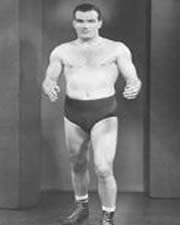
William Potts, Ont (July 25, 1915 – February 4, 1990) was a Canadian professional wrestler best known by his ring name Whipper Billy Watson, and was a two-time world heavyweight wrestling champion.
For four years as a teenager, Watson sold the Toronto Daily Star at the corner of Danforth and Dawes Road. He was convinced by his brother George to play hooky from piano lessons one Saturday to attend a wrestling session at the All Hallows Anglican Church gymnasium. The event changed Watson’s life. He furthered his wrestling training with Phillip Lawson at the Bowles Athletic Club and later the Central YMCA.
In 1936, wrestling as Bill Potts, Watson appeared on cards at British Consols Stadium in Toronto that were advertised as amateur wrestling shows. In June of that year, he went on a tour of the United Kingdom along with fellow Toronto wrestlers Tommy Nelson, Al Korman, and Ken “Tiger” Tasker and their manager, Harry Joyce. The wrestling of England often involved hard-nosed shooting and he was sidelined for six months with a fractured shoulder and numerous broken ribs. It was on this tour that William Potts became Billy Watson. Booked by former Olympic Gold Medalist George de Relwyskow, Watson traveled through England and Ireland. He was one of the best wrestlers in the world
After four years abroad, Watson and his wife returned to Canada, and he began wrestling at Maple Leaf Gardens in Toronto under 27-year-old promoter Frank Tunney. Watson made his Gardens debut in the opening match of the October 3, 1940. Newspaper reports in November said Watson was frustrated with not getting a main event match in his first six appearances at the Gardens. He appeared in one Gardens main event in February 1941 but his big push came two months later. According to storyline, Watson filed a lawsuit against Tunney for breach of contract, claiming that he had been signed to wrestle a main event against Masked Wolf. When Tunney held an open tournament to determine the number one contender for the world title on May 1, 1941, Watson entered — filing a copy of his entry form with the Ontario Athletics Commission so that Tunney couldn’t claim he didn’t enter — and then won four matches in one night to win the tournament.
From that point on, Watson was positioned as a legitimate main event performer, a position that was cemented during Watson’s feud with Nanjo Singh, which began in January 1942. Watson soon became a crowd favourite and within a few years was a mainstream celebrity and one of Toronto’s most popular citizens. Frank Tunney estimated that Whipper Watson drew more than five million people in main events of shows in Toronto. As one of the most popular wrestlers in the city’s history, Watson spent 31 years entertaining fans. His debut at Maple Leaf Gardens was on October 3, 1940, and his last match was held on November 28, 1971.


